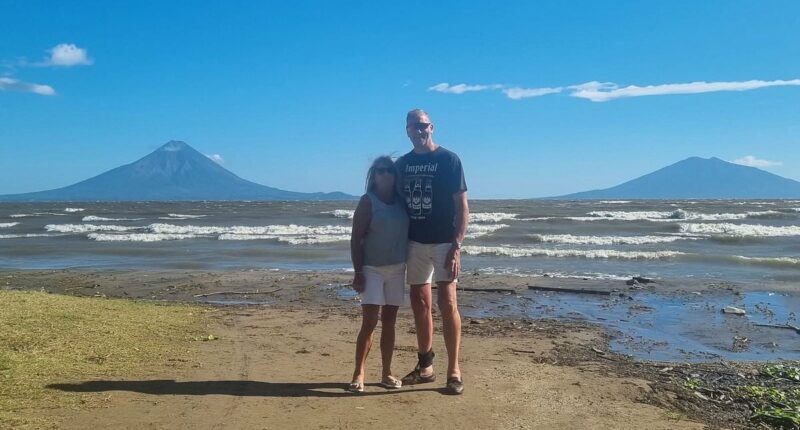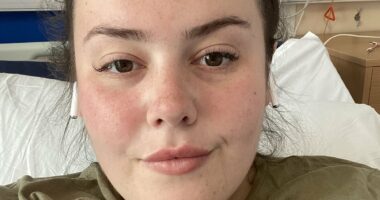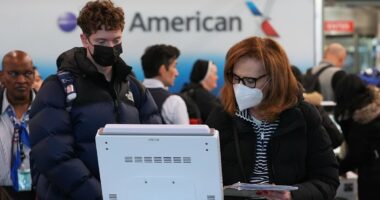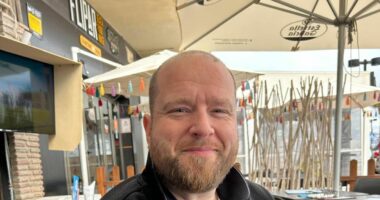Share this @internewscast.com
A retired British couple living in Nicaragua has been left stunned after being refused cancer treatment by the NHS. This comes after Michael West, a former army engineer, was diagnosed with a rare and aggressive type of blood cancer.
Michael and Kim West, originally from Dover, relocated to San Juan del Sur, Nicaragua, last year. Having just begun enjoying their state pensions, they embarked on an adventure to build their dream home in Central America.
However, only a few months after completing their £230,000 home, 69-year-old Mr. West received the unfortunate diagnosis of multiple myeloma. This type of blood cancer impacts the bone marrow, the spongy tissue within bones responsible for blood cell production.
Reflecting on the harsh news, Mrs. West, aged 68, shared, “He was shedding weight and suffering from pain in his bones, chest, and pelvis.”
“Michael stands tall at 6’6″ and has always maintained a slender figure, but he just became so alarmingly thin—it was distressing to witness,” she added.
“One evening, his rib pain intensified to the point where he was nearly in tears. I rushed him to a clinic, and the blood tests they conducted showed alarming results,” she recounted.
‘The healthcare here is better than anywhere in the UK. They saw him the next day, the consultant looked at the results and knew straight away what it was.’
A bone marrow biopsy—where a small piece of bone marrow is extracted for testing—confirmed the doctor’s suspicions and the father-of-one was diagnosed with cancer in July.

Just three months after completing the build, Michael West was diagnosed with a rare type of blood cancer
So far, the couple have spent over £64,000 on treatment—not realising that when they moved away for good they would ‘no longer automatically be entitled to medical treatment in the UK under normal NHS rules.’
‘A lot of people in the UK keep asking me why we won’t come back,’ Ms West explained.
‘I was born and bred in Britain, I’m as English as they come, so is Michael. We didn’t realise we can’t access the NHS except for emergencies because we don’t have a house there.
‘But it’s safer here than anywhere I’ve ever been in my whole life, and it’s a beautiful place. We’ve both always been as healthy can be,’ she added.
There are an estimated 6,000 new cases of myeloma per year in the UK, with more than 35,000 in the US.
It occurs due to changes in plasma cells’ DNA turning them into abnormal myeloma cells, which replicate at a faster rate and cause a host of problems.
It’s often called multiple myeloma because it can be found in several places — wherever there is bone marrow.
But symptoms of the disease — which include back pain, broken bones, fatigue, and recurring infection — are often missed instead being linked to just general ageing or minor conditions and injuries.

The couple moved to Nicaragua in 2024 after selling their home in the UK and receiving their state pensions

Before moving to Central America, Michael had always been healthy, serving as an engineer in the army
The former engineer started treatment right away, a combination of targeted medicines to kill cancer cells, and other drugs to help prevent bone thinning and relieve pain, each treatment costing in excess of £3,270 .
But then his haemoglobin—the protein in red blood cells responsible for delivering oxygen around the body—dropped so low he needed a blood transfusion, which cost even more money.
Mr West then spent 10 days in intensive care where he was started on dialysis after he began to show signs of kidney disease as a result of abnormal proteins secreted by the cancer cells damaging his organs.
‘I was absolutely shocked,’ his wife recalled. ‘I have this 6ft 6″ husband who I adore and he’s got cancer. He’s never been ill and now he can barely walk.’
‘We bought a zimmer from for days when he feels a bit fragile, it’s just horrible to watch. Even though it’s not chemo, it makes him feel terrible.’
Mr West still requires weekly dialysis, costing the couple nearly £460 a week, ‘eating away’ at their savings as they struggle to raise the funds to keep Mr West alive.
‘This is an aggressive cancer than can be treated, but it takes a lot of money which we just didn’t expect to be paying out,’ Ms West said.
Her husband added the diagnosis was a ‘big shock’ and whilst he is ‘not feeling good at all’, they would rather be in Nicaragua than in the UK.

Kim, a former equestrian, says despite the immense cost, they are much happier in Nicuagra and wouldn’t consider moving back

Since the move, Michael is no longer entitled to medical treatment in the UK – meaning the couple has to pay for his life saving treatments which is slowly eating away at their savings

The couple moved to Nicaragua to build their dream home which cost £230,000

The couple who previously had enough savings to cover building the house and live comfortably under normal circumstances are now having to fundraise to cover the cost of Michael’s treatment
‘It’s a beautiful country, it’s stunning, unpopulated, there’s not really any tourism and prices here are much lower than the UK. Someone said to look at Nicaragua, we came for two weeks and decided this is where we meant to be.’
Mr West now faces further treatment which will be overseen by the pain management team, who are concerned about the effect painkillers will have on his kidneys, for which his wife has set up a GoFundMe page.
However, myeloma cannot always be cured. Multiple myeloma is considered a rare form of the disease, accounting for just 2 per cent of all cancer diagnoses in the UK.
The NHS website states: ‘If you’re moving abroad on a permanent basis, you’ll no longer automatically be entitled to medical treatment in the UK under normal NHS rules.
‘This is because the NHS is a residence-based healthcare system.’
It comes as almost 1.4million cancer patients in the UK have been let down by a ‘postcode lottery’ of care, according to a damning report.
Four in ten people living with the disease say the struggled to get the most suitable treatment simply because of where they live.
Macmillan Cancer Support warns this unfair variation – likened to ‘flipping a coin’ – is leaving some people with fewer treatment options and little choice but to travel long distances for the treatment they need. Many face increased costs, stress, anxiety and exhaustion as a result, the charity added.
Meanwhile, an estimated 60,000 more people each year across the UK would get faster cancer care if waiting times nationwide matched the best performing areas, according to Macmillan’s analysis of NHS data.

















